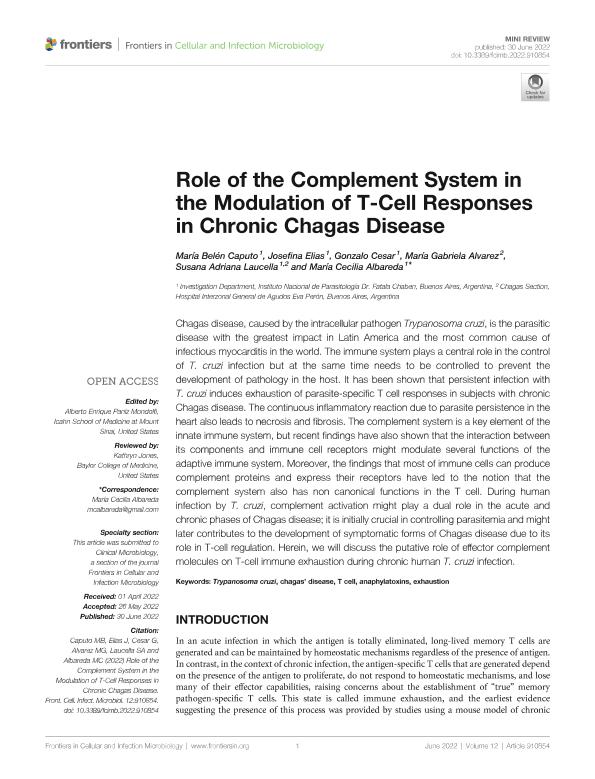Mostrar el registro sencillo del ítem
dc.contributor.author
Caputo, María Belén

dc.contributor.author
Elias, Maria Josefina

dc.contributor.author
Cesar, Gonzalo Leandro

dc.contributor.author
Alvarez, María Gabriela
dc.contributor.author
Laucella, Susana Adriana

dc.contributor.author
Albareda, María Cecilia

dc.date.available
2024-01-15T15:52:54Z
dc.date.issued
2022-06
dc.identifier.citation
Caputo, María Belén; Elias, Maria Josefina; Cesar, Gonzalo Leandro; Alvarez, María Gabriela; Laucella, Susana Adriana; et al.; Role of the Complement System in the Modulation of T-Cell Responses in Chronic Chagas Disease; Frontiers Media; Frontiers in Cellular and Infection Microbiology; 12; 6-2022; 1-6
dc.identifier.issn
2235-2988
dc.identifier.uri
http://hdl.handle.net/11336/223621
dc.description.abstract
Chagas disease, caused by the intracellular pathogen Trypanosoma cruzi, is the parasitic disease with the greatest impact in Latin America and the most common cause of infectious myocarditis in the world. The immune system plays a central role in the control of T. cruzi infection but at the same time needs to be controlled to prevent the development of pathology in the host. It has been shown that persistent infection with T. cruzi induces exhaustion of parasite-specific T cell responses in subjects with chronic Chagas disease. The continuous inflammatory reaction due to parasite persistence in the heart also leads to necrosis and fibrosis. The complement system is a key element of the innate immune system, but recent findings have also shown that the interaction between its components and immune cell receptors might modulate several functions of the adaptive immune system. Moreover, the findings that most of immune cells can produce complement proteins and express their receptors have led to the notion that the complement system also has non canonical functions in the T cell. During human infection by T. cruzi, complement activation might play a dual role in the acute and chronic phases of Chagas disease; it is initially crucial in controlling parasitemia and might later contributes to the development of symptomatic forms of Chagas disease due to its role in T-cell regulation. Herein, we will discuss the putative role of effector complement molecules on T-cell immune exhaustion during chronic human T. cruzi infection.
dc.format
application/pdf
dc.language.iso
eng
dc.publisher
Frontiers Media

dc.rights
info:eu-repo/semantics/openAccess
dc.rights.uri
https://creativecommons.org/licenses/by-nc-sa/2.5/ar/
dc.subject
ANAPHYLATOXINS
dc.subject
CHAGAS’ DISEASE
dc.subject
EXHAUSTION
dc.subject
T CELL
dc.subject
TRYPANOSOMA CRUZI
dc.subject.classification
Parasitología

dc.subject.classification
Ciencias de la Salud

dc.subject.classification
CIENCIAS MÉDICAS Y DE LA SALUD

dc.title
Role of the Complement System in the Modulation of T-Cell Responses in Chronic Chagas Disease
dc.type
info:eu-repo/semantics/article
dc.type
info:ar-repo/semantics/artículo
dc.type
info:eu-repo/semantics/publishedVersion
dc.date.updated
2024-01-15T14:59:22Z
dc.journal.volume
12
dc.journal.pagination
1-6
dc.journal.pais
Estados Unidos

dc.description.fil
Fil: Caputo, María Belén. Dirección Nacional de Instituto de Investigación. Administración Nacional de Laboratorio e Instituto de Salud "Dr. C. G. Malbrán". Instituto Nacional de Parasitología "Dr. Mario Fatala Chaben"; Argentina. Consejo Nacional de Investigaciones Científicas y Técnicas; Argentina
dc.description.fil
Fil: Elias, Maria Josefina. Dirección Nacional de Instituto de Investigación. Administración Nacional de Laboratorio e Instituto de Salud "Dr. C. G. Malbrán". Instituto Nacional de Parasitología "Dr. Mario Fatala Chaben"; Argentina. Consejo Nacional de Investigaciones Científicas y Técnicas; Argentina
dc.description.fil
Fil: Cesar, Gonzalo Leandro. Dirección Nacional de Instituto de Investigación. Administración Nacional de Laboratorio e Instituto de Salud "Dr. C. G. Malbrán". Instituto Nacional de Parasitología "Dr. Mario Fatala Chaben"; Argentina. Consejo Nacional de Investigaciones Científicas y Técnicas; Argentina
dc.description.fil
Fil: Alvarez, María Gabriela. Provincia de Buenos Aires. Ministerio de Salud. Hospital Interzonal de Agudos "Eva Perón"; Argentina
dc.description.fil
Fil: Laucella, Susana Adriana. Consejo Nacional de Investigaciones Científicas y Técnicas; Argentina. Provincia de Buenos Aires. Ministerio de Salud. Hospital Interzonal de Agudos "Eva Perón"; Argentina. Dirección Nacional de Instituto de Investigación. Administración Nacional de Laboratorio e Instituto de Salud "Dr. C. G. Malbrán". Instituto Nacional de Parasitología "Dr. Mario Fatala Chaben"; Argentina
dc.description.fil
Fil: Albareda, María Cecilia. Consejo Nacional de Investigaciones Científicas y Técnicas; Argentina. Dirección Nacional de Instituto de Investigación. Administración Nacional de Laboratorio e Instituto de Salud "Dr. C. G. Malbrán". Instituto Nacional de Parasitología "Dr. Mario Fatala Chaben"; Argentina
dc.journal.title
Frontiers in Cellular and Infection Microbiology
dc.relation.alternativeid
info:eu-repo/semantics/altIdentifier/doi/http://dx.doi.org/10.3389/fcimb.2022.910854
Archivos asociados
